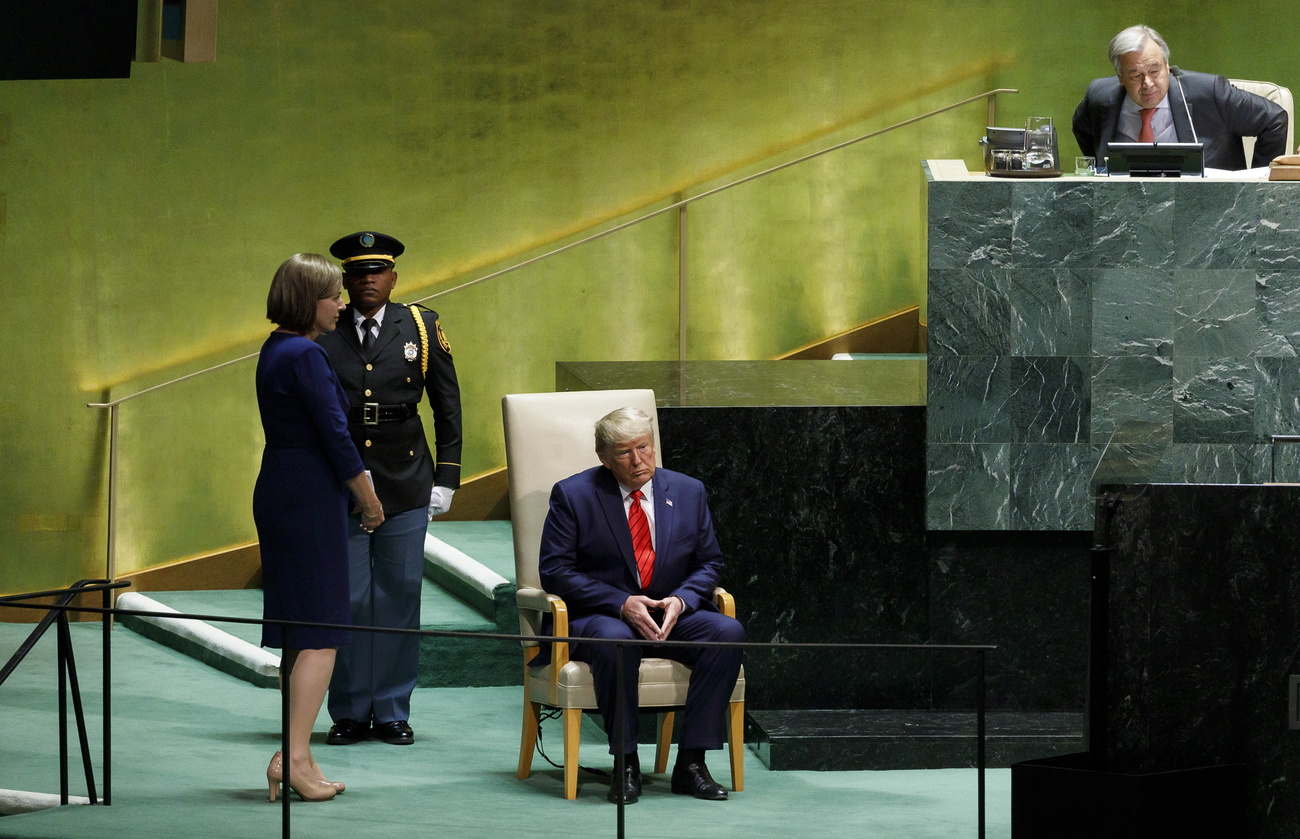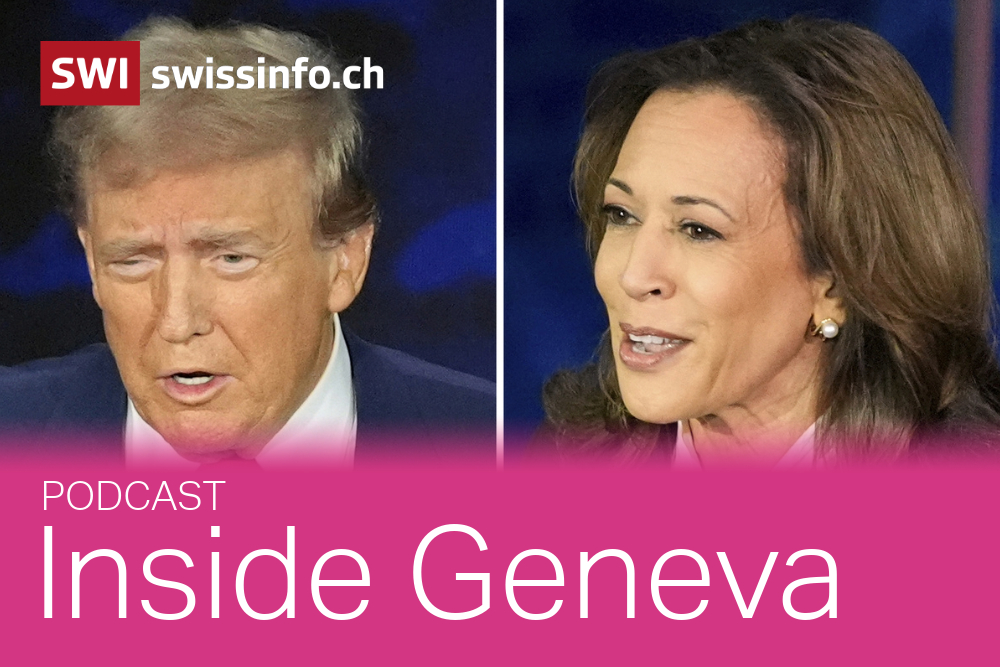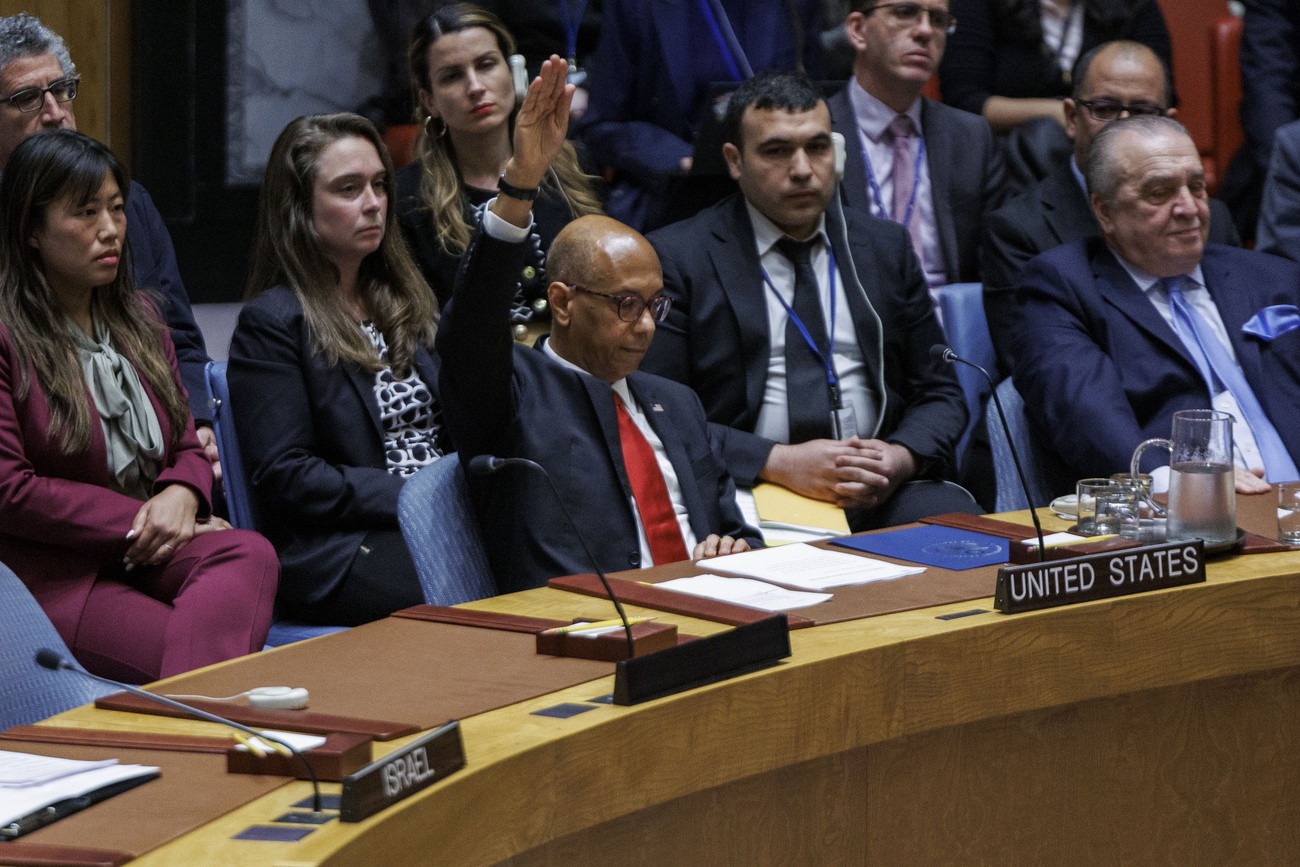
US election: is America drifting away from International Geneva?

As US president, Donald Trump gave Geneva’s international organisations a rough time, withdrawing from several of them. His successor, Joe Biden, promised that the United States would return to multilateral affairs, but his actions have not always borne this out.
International Geneva has bitter memories of Trump’s first term in office. During his four years in the White House, from 2017 to 2021, the former president launched a string of attacks on the multilateral system. Deeming them “biased”, “inadequate” and generally contrary to American interests, his administration left the Human Rights Council, withdrew from the World Health Organization in the midst of a pandemic, and caused deadlocks within the World Trade Organization.
His successor, Joe Biden, was quick to promise that the United States would return to multilateralism. Not only did the Democrat president rejoin several of the treaties and bodies abandoned during the Trump era, but his administration also embarked on several campaigns in Geneva, succeeding in getting Americans elected to key positions. For example, at the head of the International Telecommunication Union.
And in 2021, Geneva got to shine again on the world stage by hosting a summit between Biden and Russian president Vladimir Putin meant to ease tensions between the two countries.

But these big moves have not convinced observers in Geneva that the US is fully recommitted to multilateralism. Because beyond grand statements, Biden has not always supported the multilateral bodies that were created in the aftermath of the Second World War.
“It’s been years since an American president has shown any real enthusiasm for the multilateral system,” says Geneva-based Swiss-American political scientist Daniel Warner. “And even though we know that Donald Trump is diametrically opposed to it, we haven’t seen a big push for the United Nations from Joe Biden’s administration.”
+ Listen to our Inside Geneva podcast: does it matter to the UN who’s in the White House?

More
Inside Geneva: does it matter to the UN who’s in the White House?
The American people will go to the polls on November 5 to decide the fate of the presidential election that pits Republican candidate Trump against Democratic candidate Kamala Harris. Its outcome will inevitably have consequences for International Geneva, home of the European headquarters of the United Nations and a city where American influence has historically been strong.
Neither candidate has made multilateralism a central theme of their campaign. And there is every reason to believe that if Harris were to win, she would follow in her predecessor’s footsteps, while Trump would continue in the direction of his first term.
From Trump to Biden: ‘America First’
“We shouldn’t be distracted by words. If one looks closely, the changes in policy between Donald Trump and Joe Biden were less marked than one might think,” says Martin Dahinden, Swiss ambassador to the United States between 2014 and 2019. “There has been no radical shift between the two administrations.”
With his slogan “America first”, Trump has never hidden his transactional approach to relations between the US and the rest of the world. And Biden has not really distanced himself from this approach.
Like that of his predecessor, Biden’s administration continues to block the appointment of new judges to the World Trade Organization’s Appellate Body, rendering obsolete this court responsible for settling international trade disputes. Washington argues that its decisions threaten the country’s sovereignty. Biden has also followed in Trump’s footsteps by increasing tariffs on some Chinese imports, which Beijing argues is against the rules of the Geneva-based organisation.
“We have to remember that the United States is a nation state that has its own interests at heart, not those of the rest of the world. Unless those interests coincide with its own,” says Jussi Hanhimäki, professor of international history at the Geneva Graduate Institute.
Loss of influence
Biden’s administration has largely bypassed the UN on peace and security issues, as did Trump. On the war in the Middle East, the US has repeatedly vetoed Security Council resolutions calling for a ceasefire in Gaza, preferring to conduct its own negotiations outside UN bodies.
The experts SWI swissinfo.ch interviewed agree that the US no longer enjoys the same influence in multilateral bodies as it used to, an observation that does not seem to worry either presidential candidate. According to Warner, this trend has been exacerbated in the wake of the war in the Middle East.

Since October 2023, Biden’s unconditional support for Israel, despite the many civilian casualties in Gaza and Israel’s Prime Minister Benyamin Netanyahu’s attacks on the UN and its secretary-general, has angered part of the international community, particularly countries of the Global South. “The UN is facing enormous financial difficulties, a crisis of legitimacy and the United States has not shown its support, on the contrary,” says Warner.
A further disengagement of the US from the UN system would certainly have harmful consequences for the organisation and its Geneva-based bodies, warns Hanhimäki. “The United States is an important player in the UN system, although it is also one of its biggest critics. If the country becomes totally non-responsive or opposed to the UN, it will be more difficult for the organisation to remain effective.”
A vacuum to be filled
American elections are of particular importance for the multilateral system. Not only has the US been one of its main instigators – from the creation of the League of Nations to that of the UN – it is also its biggest financial backer.
In 2023, the country’s contribution accounted for 28% of the UN and its agencies’ revenueExternal link compared to 12% from Germany and 5% from Japan and China each.
Reflecting the importance of American funding, the UN went through a liquidity crisis last year when Congress blocked payments to the organisation. In Geneva, the Palais des Nations was temporarily closed to save money.
Yet some non-Western states would welcome a multilateral order more detached from American influence.
In Geneva, the withdrawal of the US from the Human Rights Council created a vacuum that China was quick to fill. Beijing had the opportunity to put forward its own vision of human rights, and succeeded in having resolutions adopted that weakened the notion that countries that violate human rights should be denounced.
“It would be good if the UN was in no way dependent on any one state,” says Hanhimäki. “But if China simply takes the place of the United States, that might not exactly be good news for the UN system,” he adds. “But if voices that traditionally have not been heard actually become heard, then that would be a big plus.”
Trump vs Harris
A few days before the election, the candidates are neck-and-neck in the polls, and their foreign policy priorities remain rather vague for the time being.
“There could be gradual changes, but not dramatic ones. Even if bold statements are possible,” says Dahinden. According to him, the next administration’s foreign policy will depend above all on the actions of major rival powers such as China and Russia. “There is a great deal of continuity in foreign policy. And we mustn’t forget that in the United States Congress plays an important role.”
A majority of the seats in the US Congress are also up for renewal on November 5. A third of the seats in the Senate (predominantly Democrat) and all those in the House of Representatives (predominantly Republican) are at stake. The majorities that will emerge from the ballot box will have an impact on the real power of the next tenant of the White House.

British diplomatic sources quoted by PoliticoExternal link fear that, if elected, Trump may decide to attack the budget of the UN and its agencies again. During his first term in office, he made cuts to the budgets of the United Nations Population Fund, the United Nations Programme on HIV/AIDS and the UN Agency for Palestinian Refugees (UNRWA).
“It’s very difficult to know what Trump is going to do,” says Warner. “It is clear that he is violently opposed to multilateralism. Can he do worse than he did in his first term? I imagine so, but I don’t dare think about it.”
Regarding Harris, the experts we interviewed say that it remains difficult to know what her foreign policy priorities will be, but they believe that they will not deviate too much from Biden’s.
“The consequences of this election will be more important for the Americans than for anyone else,” points out Hanhimäki. And given the difficulties at home, International Geneva is likely to take a back seat. Perhaps as a sign of disengagement, the US recently did not stand for re-election to the Human Rights Council.
Edited by Virginie Mangin/ac

In compliance with the JTI standards
More: SWI swissinfo.ch certified by the Journalism Trust Initiative


























You can find an overview of ongoing debates with our journalists here . Please join us!
If you want to start a conversation about a topic raised in this article or want to report factual errors, email us at english@swissinfo.ch.